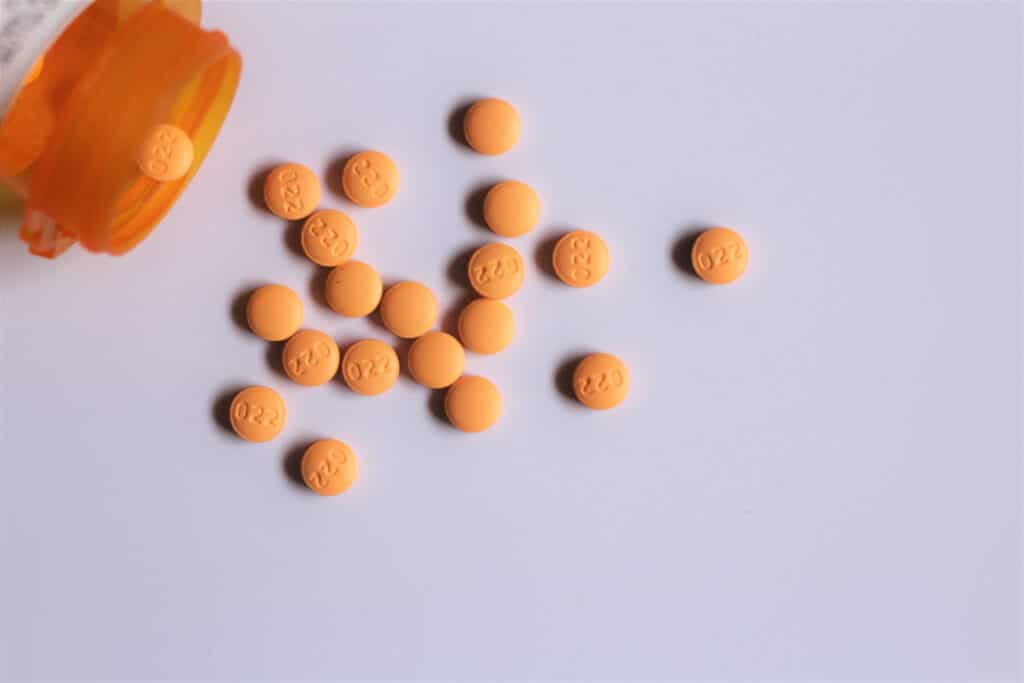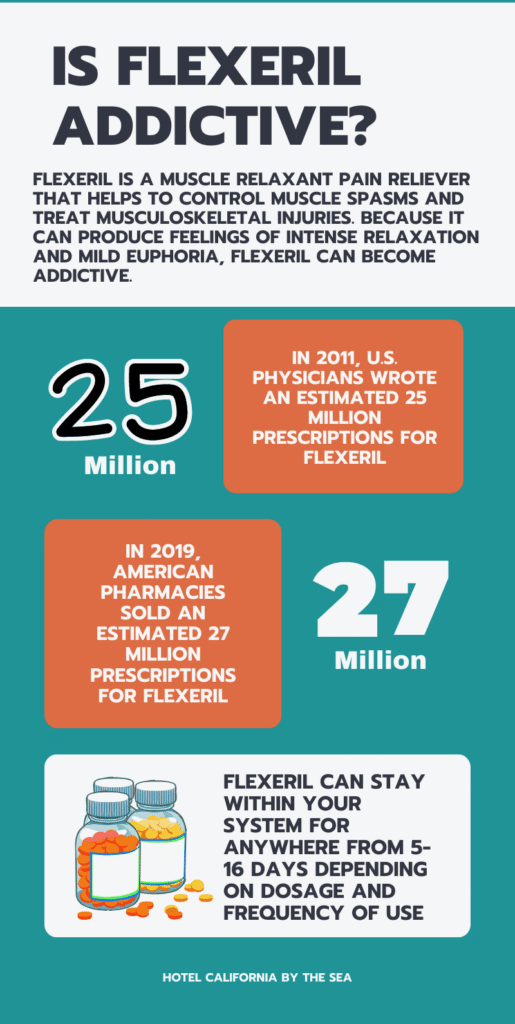Is Flexeril Addictive?
Can a muscle relaxant pain reliever become an addictive substance? Is Flexeril addictive? Flexeril is the brand-name medication for cyclobenzaprine, which is a prescription muscle relaxer that helps control muscle spasms. It is often prescribed to help treat short-term pain and discomfort of muscle injuries including muscle strain, sprains, and spasms. Flexeril affects the central nervous system and blocks out any sensations of pain. It prevents the pain and nerve signals from reaching your brain and producing a sense of calm and relaxation. With these types of effects, it can easily become addictive in which a person will continue to misuse the medication in order to achieve a sense of mild euphoria and sedation.
Flexeril is FDA-approved as an adjunct treatment method in combination with physical therapy to treat muscle injuries. In 2011, U.S. physicians wrote an estimated 25 million prescriptions for Flexeril and other medications containing cyclobenzaprine. In 2019, American pharmacies across the country sold an estimated 27 million prescriptions for Flexeril. With Flexeril and other medications containing cyclobenzaprine becoming more accessible and available, there has also been an increase in overdose and addiction. It is important to only take Flexeril as prescribed by a medical provider.

How does Flexeril work?
Flexeril is a central nervous system depressant and works by blocking pain sensations from reaching the brain. It reduces both cognitive and physical activity in the body which reduces skeletal muscle hyperactivity as well as mental sedation. The muscle relaxant helps relieve muscle spasms and reduce localized pain and tenderness caused by trauma to the muscles.
Side Effects of Flexeril Abuse
- Extreme drowsiness
- Fatigue
- Headaches
- Dizziness and nausea
- Insomnia
- Mood changes
- Blurred vision
- Confusion and hallucinations
- Fever and sweating
- Muscle stiffness or twitching
- Accelerated and abnormal heart rate
- Dangerously low blood pressure
- Abdominal pain
- Nervousness
- Constipation and urination problems
- Seizures and tremors

Flexeril’s pain-blocking mechanism is the most significant contributor to the allure of abusing the medication and developing an addiction. Because Flexeril is not a controlled substance, obtaining and using the prescription medication can be easier than most mind-altering substances. People who become addicted to Flexeril take it to mask their pain or injury, they have developed a tolerance to the medication or have become addicted to the way it makes them feel.
Long-term misuse of Flexeril can lead to issues with the central nervous system and produce unwanted side effects of agitation, anxiety and psychosis. Another dangerous side effect of misuse is muscle relaxant toxicity. This occurs when high doses of muscle relaxants become toxic. It can cause changes in blood pressure, heart rhythm and cardiovascular activity. It can also cause adverse effects such as increased muscle activity.
The risk of central nervous system depression is increased when misusing Flexeril over a long period of time. This occurs within 30 minutes to 2 hours of ingesting a toxic dose of muscle relaxant. Symptoms include slurred speech, intense lethargy, lack of coordination and respiratory depression.
The risk of addiction and overdose is amplified when the medication is used alongside other substances such as benzos and alcohol. When used with these medications, Flexeril only enhances the CNS depressant side effects of the other medication and can produce a greater sense of intense relaxation and euphoria. A perfect example of this is using Flexeril and alcohol.
Flexeril and Alcohol
Flexeril and alcohol are common combinations seen among polysubstance use. When taken together, they can amplify each other’s sedative side effects. Muscle relaxers such as Flexeril and alcohol both work to slow down brain activity in the body. This in turn slows down breathing and heart rate. It can enhance psychoactive effects as well as cause dizziness and drowsiness. The combination of Flexeril and alcohol can lead to extreme respiratory depression, which affects cognitive function as well as physical motor skills. People taking both substances are more prone to physical accidents, poor motor skills and impaired judgment.
The combination of the two causes compounding effects on the body and can easily lead to dependence and addiction. Dangerous symptoms of Flexeril and alcohol include intense drowsiness or lightheadedness, reduced motor control and coordination, slowed breathing, memory impairment, increased risk of seizure and an increased risk of overdose.
Check Your Insurance Coverage for FREE
Find out if your insurance covers addiction treatment in minutes. We accept most insurance!
How long does Flexeril stay in your system?
Flexeril can stay within your body for quite a while after you’ve taken the medication. On average, Flexeril can stay in your system anywhere between 5 -16 days depending on the strength or dosage of medication. There are many factors that contribute to how long the substance remains in the body.
- How much and how often you take the medication
- Your metabolic rate – If you have a slower metabolism, this increases the time in which the drug stays in your body
- Your age
- Your overall health
- Your BMI
- If you are taking other medications or substances along with Flexeril
The half-life for Flexeril is an average of 8-37 hours, where elimination of the substance typically occurs within 3 days. Flexeril comes in many different strengths. The extended-release formula can last between 7-8 hours. It takes an average of 32 hours to metabolize in the body. Extended-release capsules can last the entire day and are designed for a slower release of medication. The immediate-release formula lasts around 4-6 hours and when taken with food, can increase the speed of absorption. It takes an average of 18 hours to metabolize in the body.
Flexeril works by blocking certain neurotransmitter activities in the brain. These chemicals are used to transmit messages within the nervous system throughout the body. When these chemicals are blocked it can affect the muscle cells in the glands of the endocrine system, cardiovascular system and other areas of the body. Slowing down the activity in these areas ultimately slows down body function to a point where a person can go into overdose and resulting in death.
According to the American Association of Poison Control Centers, in 2016, an estimated 10,615 cases mentioned the use of Flexeril. An estimated 4,400 cases were directly associated with substances like Flexeril that contained cyclobenzaprine.
Reach out to Hotel California by the Sea
We specialize in treating addiction and other co-occurring disorders, such as PTSD. Our Admissions specialists are available to walk you through the best options for treating your addiction.
Addiction to sedative medications such as Flexeril is becoming a common occurrence in behavioral health care. Hotel California by the Sea provides substance use disorder treatments through varying levels of care. Detox, residential, PHP and IOP programming guide clients through each step of the rehab process in treating their substance addiction. Specialized treatments such as CBT, DBT and EMDR therapy allow clients to uncover the root causes of their addiction. Oftentimes, addiction is rooted in mental health disorders or vice versa. Hotel California by the Sea specializes in treating co-occurring mental health conditions that present alongside substance addictions such as Flexeril addiction.
References:
https://www.addictioncenter.com/stimulants/antidepressants/flexeril/
https://www.goodrx.com/cyclobenzaprine/what-is
https://www.ncbi.nlm.nih.gov/books/NBK513362/
https://www.help.org/flexeril-addiction/
https://www.deadiversion.usdoj.gov/drug_chem_info/cyclobenzaprine.pdf
https://www.verywellhealth.com/muscle-relaxers-for-arthritis-patients-190095
https://www.healthline.com/health/muscle-relaxers-and-alcohol
https://www.drugs.com/medical-answers/how-long-does-flexeril-stay-in-your-system-374063/
